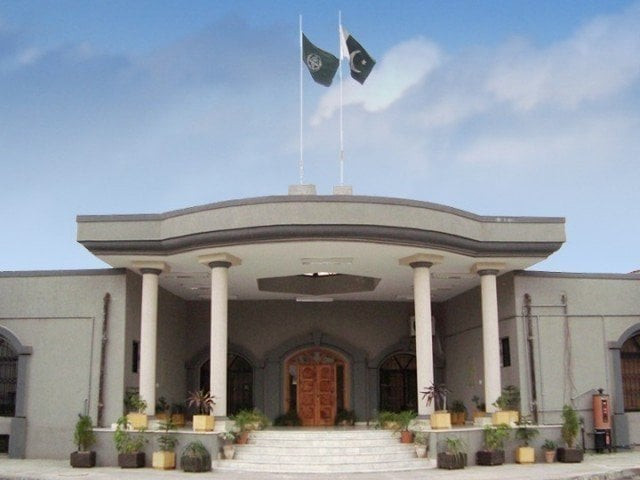IHC reserves verdict on Imran's plea for online court appearances
CJ Farooq says he 'favours use to technology' as AAG Duggal questions if similar relief would be extended to others

The Islamabad High Court (IHC) on Tuesday reserved its verdict on Pakistan Tehreek-e-Insaf (PTI) Chairman and former premier Imran Khan's request seeking permission to continue court appearances virtually.
In March, the PTI chief moved the high court to permit him to appear before the courts through video-link due to "security threats".
In a petition filed through advocate Faisal Chaudhry, the former premier – who currently faces charges in the Toshakhana (gift depository) case – requested attendance at the hearing through video call citing 'security concerns'.
He furthered that court proceedings were also stalled owing to security reasons.
The petition added that Imran should be given “strict security” if he is to appear in courts in the federal capital.
Notably, a similar request was filed with the Lahore High Court (LHC), and last week, a special anti-terrorism court (ATC) even granted Imran one-time permission to attend the hearing through video-link regarding a plea filed for his pre-arrest bail in three FIRs, including an alleged attack on police officials and setting ablaze state properties in the Zaman Park area.
Read Imran wants caretakers replaced by administrators
IHC Chief Justice (CJ) Aamer Farooq presided over the proceedings today where Imran's lawyer Salman Akram Raja presented his case.
During the hearing, the high court's top judge observed that in criminal cases, the need for appearances varies in different stages of the proceedings.
Imran's lawyer cited the Meesha Shafi versus Ali Zafar case where the former was permitted to continue her cross-examination via video link. He also stressed that the PTI chief faced serious security threats and that the cases against him were "piling up on a daily basis".
"Right now there are over 120 cases filed against him," the lawyer said.
He also argued that the main reason for requiring the presence of the accused when charges are being framed is for their own benefit, "so that they can hear what they are being accused of" which he maintained could be fulfilled with virtual court appearance as well.
"Technology should be used, wherever it can be," CJ Farooq remarked.
"However, this matter does not just concern Imran Khan," the judge added noting that the outcome of this verdict would also impact other cases.
"It can be deemed acceptable so long as the evidence is being collected," he said but expressed reservations over the same flexibility being allowed when charges are to be framed.
Additional Attorney General (AAG) Munawar Iqbal Duggal on the other hand argued that the presence of the accused was "necessary" for criminal trials.
"So far, there are no such rules in place that would support their arguments," the AAG furthered.
CJ Farooq, however, noted that the Criminal Procedures Code 1898 predated recent technological developments and remarked that he favoured the use of the latest technologies.
The AAG maintained that there were procedures in place for amending laws, to which the court responded by questioning if he was implying that permission could not be granted until rules were amended.
"The petitioner is the leader of a major political party, whether someone likes it or not," the CJ stated.
The AAG on the other hand maintained that "such a perception should be avoided that a specific person is being granted such a relief. Whatever orders are issued, they should be without discrimination."
CJ Farooq also noted that the Indian Supreme Court had also announced its verdict via video link to which AAG Duggal argued that in the case of India, efforts had been underway to install such a system since 2005.
Read more Imran fears ‘attack’ on his residence on Eid
"A full system would have to be in place to ensure that the accused present during the hearing via video link is alone in the room," he said while reiterating his earlier argument that a "perception of discrimination" should be avoided at all costs.
"A former prime minister was not permitted this relief in an appeal even," he added.
Irked by the arguments presented by the AAG, CJ Farooq said that "you are not here to present arguments on political issues" and asked him to inform the court about the practice in India, the United States and the United Kingdom.
AAG Duggal said that in the case of the latter two countries, permission to attend court proceedings via video link vary case to case.
The court observed that if all legal conditions are being met, the trial could be conducted via video link.
Duggal however expressed reservations, questioning if an accused could even be permitted to enjoy the same relief "if they are outside of the country".
Imran's lawyer on the other hand maintained that if an individual was "not a fugitive" and "willing to give an undertaking that he would not leave the country" then such permissions should be granted. He also suggested that the court could direct Imran to appear at a location of its choosing in Lahore.
After hearing all arguments, the court reserved its verdict.



















COMMENTS
Comments are moderated and generally will be posted if they are on-topic and not abusive.
For more information, please see our Comments FAQ